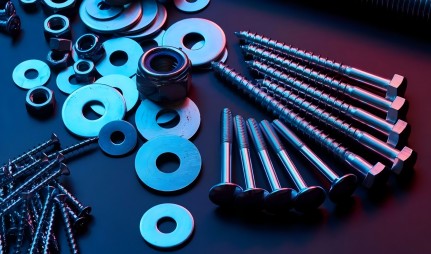Fasteners are widely used in many fields such as industry, construction, and mechanical manufacturing. Knowing how to use these fasteners effectively is an important part of ensuring the quality and safety of the project. Some key knowledge about the application of fasteners:
Basic types and standards of fasteners
Bolts (DIN 931, 933): Commonly used for mechanical connections and fixing of structural parts. DIN 931 is a half-threaded bolt, while DIN 933 is a full-threaded bolt. Nuts (DIN 934): Commonly used hexagonal nuts, used with bolts. Washers (DIN 125, 9021): Flat washers are used to disperse the pressure of bolts or nuts to prevent damage to the fastened surface. Self-tapping screws (DIN 7981): Used for thin plate connections without pre-drilling. Spring washers (DIN 127): Used to prevent nuts or bolts from loosening under vibration or dynamic loads.
German standard fastener materials and grades
Carbon steel: commonly used for general purposes, low carbon steel is suitable for low-strength applications, and medium and high carbon steel is suitable for applications with high strength requirements. Alloy steel: high-strength application scenarios, such as construction, bridges and machinery manufacturing. Its strength is usually expressed in grades of 8.8, 10.9, and 12.9.Stainless steel (A2, A4): A2 is used for general corrosion-resistant environments, and A4 is used for more demanding corrosion environments (such as marine and chemical environments).Galvanizing: Carbon steel or alloy steel fasteners are galvanized (electroplated or hot-dip galvanized) to enhance their corrosion resistance and are suitable for outdoor or humid environments.
Application areas
Construction: Fasteners are used for steel structures, formwork connections in concrete pouring, scaffolding and construction equipment fixing. Used to fix elevator rails to the elevator shaft wall, the connection between the rails and the rail brackets, and the fastening assistance of the column brackets and the fixed brackets. High-strength bolts (such as grade 10.9) and hot-dip galvanized bolts are commonly used.Mechanical manufacturing: In mechanical equipment, DIN 933 bolts and DIN 934 nuts are the most common combination, used with flat washers and spring washers to ensure the stability and durability of the connection. Automotive industry: High-strength alloy steel fasteners such as DIN 912 (hexagon socket bolts) are often used in automobile manufacturing, especially in parts that require high strength and vibration resistance.Home appliances and electronic equipment: Small fasteners such as DIN 7981 (self-tapping screws) are used to fix metal sheets or plastic parts without pre-drilling.
Correct selection and installation
Strength matching: Select the appropriate strength grade according to the specific application. For example, 8.8 grade bolts are used for applications with medium strength requirements, and 12.9 grade is used for high strength and critical connections.Anti-loosening measures: In vibration or dynamic load environments, use spring washers (DIN 127), nylon locking nuts or liquid thread lockers to prevent nuts from loosening.Anti-corrosion measures: In outdoor or humid environments, galvanized or stainless steel fasteners are preferred to extend service life.
Installation torque control
Torque specification: During installation, the bolts should be tightened strictly according to the torque specification to avoid thread damage due to over-tightening or connection failure due to over-loosening.Use of torque wrench: In critical connections, a torque wrench should be used to ensure that the applied torque is within the design requirements, especially in the installation of high-strength bolts.
Maintenance and inspection
Regular inspection: Regularly inspect key fasteners, especially when working in high vibration, heavy load and high temperature environments, to ensure that the fasteners are not loose, corroded or worn.Replacement cycle: According to the material and use environment of the fasteners, set a reasonable replacement cycle to avoid failures caused by fatigue or corrosion.
Compliance with standards and regulations
Compliance with German standards: In international projects, especially those involving exports or international cooperation, it is crucial to comply with DIN standards. Ensure that fasteners meet the corresponding German standards (such as DIN EN ISO 898-1: Mechanical properties standard for fasteners). Certification and quality inspection: Ensure that the purchased fasteners pass the necessary certification and quality inspection (such as ISO certification) to ensure that the product quality meets the requirements.
Through in-depth understanding and reasonable application of German standard fastener knowledge, the safety, reliability and durability of the project can be significantly improved.
Media Contact
Company Name: Ningbo Xinzhe Metal Products Co., Ltd.
Email: Send Email
Phone: +8618868999956
Address:No. 126, Chengyao Road, Hengxi Town, Yinzhou District
City: Ningbo
Country: China
Website: https://www.stampingcomponents.com/







